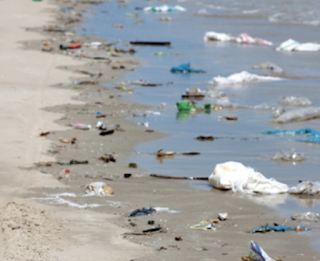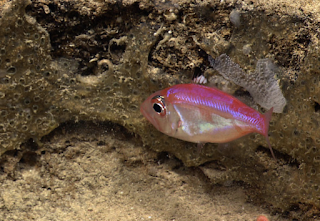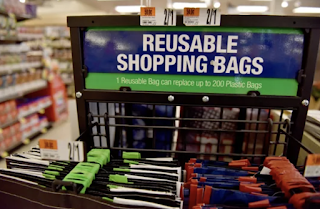‘Catch of the Day’ is fresh trash, Plastic smells like turtle food, Florida shark fin ban heads to Governor, Coronavirus – climate link seen from space and more…
Visitors lingering over an alfresco meal in the French Riviera fishing village of Saint-Jean-Cap-Ferrat might be surprised to discover that the catch of the day is plastic trash. Since May, this scenic harbor has been the pilot site for a European Union Fisheries Commission project designed to protect declining fish stock in the Mediterranean Sea while also removing tons of plastic debris from the sea. The French government, supported by the European Union Fisheries Fund, pays for the fishermen’s time. Europe’s plastics industry provides special debris-collecting trawl nets (which cost from $23,000 to $57,000 a piece) and also picks up the tab for recycling and other costs.
2. Plastic bags may smell like food to hungry sea turtles, a new study says
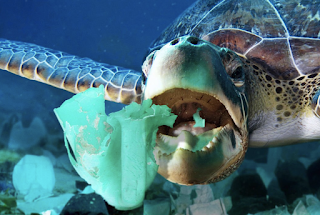 A cargo plane bound for Asia stopped at Miami International Airport for a few hours to refuel on January 24. In its belly was a consignment of 18 large cardboard boxes that, unbeknownst to the wildlife inspectors on duty, contained something highly protected and, in some cases, illegal: shark fins. “The inspectors were just like, ‘Well, let’s see if there’s anything else in it that is not supposed to be there,’” says Eva Lara, a supervisory inspector with the U.S. Fish and Wildlife Service, which regulates wildlife imports and exports.
A cargo plane bound for Asia stopped at Miami International Airport for a few hours to refuel on January 24. In its belly was a consignment of 18 large cardboard boxes that, unbeknownst to the wildlife inspectors on duty, contained something highly protected and, in some cases, illegal: shark fins. “The inspectors were just like, ‘Well, let’s see if there’s anything else in it that is not supposed to be there,’” says Eva Lara, a supervisory inspector with the U.S. Fish and Wildlife Service, which regulates wildlife imports and exports. Selling and possessing shark fins could soon be outlawed in Florida, joining about a dozen other states in attempting to protect sharks and remove the delicacy from restaurant menus. The Florida Senate unanimously approved a measure already ratified by the state House, sending the legislation to Gov. Ron DeSantis for his signature. The practice of shark finning has long been outlawed under federal law, but most states currently have no prohibitions against possessing and selling shark fins. A decade ago, Hawaii became the first state to ban the possession and sale of shark fins. Since then, about a dozen other states have enacted similar laws.
Selling and possessing shark fins could soon be outlawed in Florida, joining about a dozen other states in attempting to protect sharks and remove the delicacy from restaurant menus. The Florida Senate unanimously approved a measure already ratified by the state House, sending the legislation to Gov. Ron DeSantis for his signature. The practice of shark finning has long been outlawed under federal law, but most states currently have no prohibitions against possessing and selling shark fins. A decade ago, Hawaii became the first state to ban the possession and sale of shark fins. Since then, about a dozen other states have enacted similar laws.
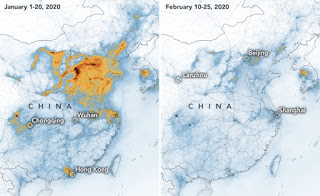 Satellites have already picked up on the startling changes coronavirus has left in its wake. The density of greenhouse gases wafting over China has markedly cleared, a direct result of an outbreak that has shuttered industries and canceled air travel. An analysis shows that China’s emissions of CO2, a major greenhouse gas that contributes to climate change, has dropped by 25 percent since the crisis began. China’s industries customarily shut down over the week-long New Year’s Holiday, when the epidemic was first identified in Wuhan. But they haven’t returned to normal operations since, as widespread closures have slashed the demand for energy.
Satellites have already picked up on the startling changes coronavirus has left in its wake. The density of greenhouse gases wafting over China has markedly cleared, a direct result of an outbreak that has shuttered industries and canceled air travel. An analysis shows that China’s emissions of CO2, a major greenhouse gas that contributes to climate change, has dropped by 25 percent since the crisis began. China’s industries customarily shut down over the week-long New Year’s Holiday, when the epidemic was first identified in Wuhan. But they haven’t returned to normal operations since, as widespread closures have slashed the demand for energy.
Most fish are broadcast spawners, casting their eggs and sperm in clouds and leaving their young to develop alone. But a tiny minority — about 2 percent — are “mouth breeders,” keeping their fertilized eggs (and sometimes hatchlings) protected in their mouths. Now, a study reveals the first fish known from the deep sea to mouth brood, researchers report February 27 in Scientific Reports. In 2015, ichthyologist Randy Singer, now at the University of Michigan Museum of Zoology in Ann Arbor, was identifying fish spotted by a remotely operated underwater vehicle for the U.S. National Oceanic and Atmospheric Administration’s Okeanos Explorer ship. A red-glinting fish flashed by the vehicle’s camera some 500 meters deep, near Puerto Rico.
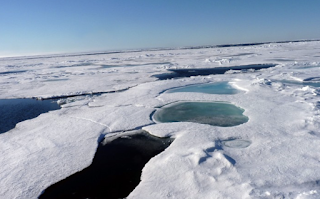 When people hear the word chlamydia, they usually think about sexually transmitted infections. And it’s true that the specific bacteria that causes chlamydia typically depend on interactions with other organisms to survive. So when a team of researchers discovered several new chlamydia-related species deep below the Arctic Ocean, in a place with no oxygen and without an apparent host organism, they were surprised. “Finding Chlamydiae in this environment was completely unexpected, and of course begged the question what on earth were they doing there?” Jennah Dharamshi, a Ph.D. student at Uppsala University in Sweden and the lead author of a recent study, said in a news release.
When people hear the word chlamydia, they usually think about sexually transmitted infections. And it’s true that the specific bacteria that causes chlamydia typically depend on interactions with other organisms to survive. So when a team of researchers discovered several new chlamydia-related species deep below the Arctic Ocean, in a place with no oxygen and without an apparent host organism, they were surprised. “Finding Chlamydiae in this environment was completely unexpected, and of course begged the question what on earth were they doing there?” Jennah Dharamshi, a Ph.D. student at Uppsala University in Sweden and the lead author of a recent study, said in a news release.
 A team of scuba-diving biologists on Wednesday released nearly 200 baby giant sea bass into the murky depths of Santa Monica Bay where the tiny, critically endangered fish could grow to be a quarter ton or more in size. The captive-bred infants quickly adapted to their new home, a submarine canyon about 30 feet beneath the waves, where the currents are rich in nutrients and tiny shrimp, a favorite food for the bass. The four-inch infants — adorned with orange, blue and gray colors — can reach 560 pounds, seven feet in length and live to be 75 years old.
A team of scuba-diving biologists on Wednesday released nearly 200 baby giant sea bass into the murky depths of Santa Monica Bay where the tiny, critically endangered fish could grow to be a quarter ton or more in size. The captive-bred infants quickly adapted to their new home, a submarine canyon about 30 feet beneath the waves, where the currents are rich in nutrients and tiny shrimp, a favorite food for the bass. The four-inch infants — adorned with orange, blue and gray colors — can reach 560 pounds, seven feet in length and live to be 75 years old.
 Abu Dhabi: The Environment Agency – Abu Dhabi (EAD) has announced a plan to make the emirate free of single-use plastic bags by 2021. The agency made the announcement as part of a new policy to reduce single-use plastics. According to a report presented in the World Government Summit in February 2019, 11 billion plastic bags are used annually in the UAE, which is the equivalent of 1,184 plastic bags per person per year compared to a global average of 307 plastic bags per person per year.
Abu Dhabi: The Environment Agency – Abu Dhabi (EAD) has announced a plan to make the emirate free of single-use plastic bags by 2021. The agency made the announcement as part of a new policy to reduce single-use plastics. According to a report presented in the World Government Summit in February 2019, 11 billion plastic bags are used annually in the UAE, which is the equivalent of 1,184 plastic bags per person per year compared to a global average of 307 plastic bags per person per year.
9. Almost alien: Antarctic subglacial lakes are cold, dark and full of secrets
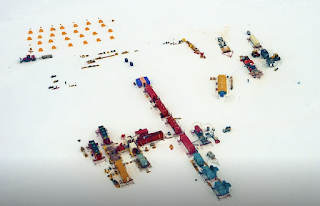 Getting water samples from an Antarctic lake under 800 meters of ice takes days of drilling, precise equipment, lots of patience and an eagerness to understand one of the world’s most extreme environments. More than half of the planet’s freshwater is in Antarctica. While most of it is frozen in the ice sheets, underneath the ice pools and streams of water flow into one another and into the Southern Ocean surrounding the continent. Understanding the movement of this water, and what is dissolved in it as solutes, reveals how carbon and nutrients from the land may support life in the coastal ocean.
Getting water samples from an Antarctic lake under 800 meters of ice takes days of drilling, precise equipment, lots of patience and an eagerness to understand one of the world’s most extreme environments. More than half of the planet’s freshwater is in Antarctica. While most of it is frozen in the ice sheets, underneath the ice pools and streams of water flow into one another and into the Southern Ocean surrounding the continent. Understanding the movement of this water, and what is dissolved in it as solutes, reveals how carbon and nutrients from the land may support life in the coastal ocean.
10. Marine conservation methods paying dividends In Oracabessa Bay
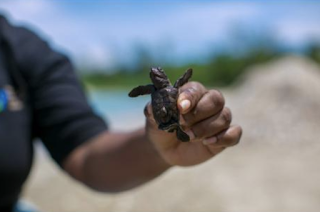 On Jamaica’s north coast, Oracabessa Bay’s biodiversity sustains its natural beauty and bounty, in addition to a sustainable source of income for those who learn how to dwell in harmony with nature. Ahead of tomorrow’s World Wildlife Day, Oracabessa Bay sits as a nesting site for the endangered hawksbill sea turtle, endangered Acrapora corals, and seafood supplies destined for local markets. Over the years, indiscriminate fishing has significantly reduced fish stocks, severely impacting the income of fishers and threatening the bay’s tourism product, while land-based pollution continues to kill coral reefs, a crucial part of the defense infrastructure and seafood basket of coastal territories.
On Jamaica’s north coast, Oracabessa Bay’s biodiversity sustains its natural beauty and bounty, in addition to a sustainable source of income for those who learn how to dwell in harmony with nature. Ahead of tomorrow’s World Wildlife Day, Oracabessa Bay sits as a nesting site for the endangered hawksbill sea turtle, endangered Acrapora corals, and seafood supplies destined for local markets. Over the years, indiscriminate fishing has significantly reduced fish stocks, severely impacting the income of fishers and threatening the bay’s tourism product, while land-based pollution continues to kill coral reefs, a crucial part of the defense infrastructure and seafood basket of coastal territories.
11. New Jersey plastic bag ban passes senate
Today, the Senate passed S864 (Smith/Greenstein). The bill prohibits the provision or sale of single-use plastic carryout bags, single-use paper carryout bags, and polystyrene foam foodservice products. It also limits the provision of single-use plastic straws and appropriates money from the Clean Communities Program Fund for public education. It will go into effect 18 months after signing for plastic bags, paper bags, and polystyrene, and 1 year for plastic straws. The bill was passed with a vote of 22-14.
12. Washington state lawmakers pass a plastic grocery bag ban
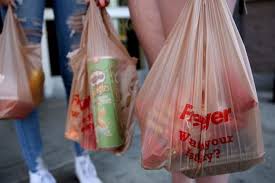 Washington state lawmakers passed a ban on plastic grocery bags and added an 8-cent fee on paper bags. Democratic Gov. Jay Inslee has not yet signed the bill passed by the state Senate Monday, The Seattle Times reported. Some conservative lawmakers supported the Democrat-sponsored legislation in the hopes it will create paper bag demand and energize Washington’s pulp and paper industry. The legislation received support from “the pulp and paper industry, the environmental community, the large and small grocers, the labor industry,” said Democratic Sen. Mona Das, the bill’s sponsor.
Washington state lawmakers passed a ban on plastic grocery bags and added an 8-cent fee on paper bags. Democratic Gov. Jay Inslee has not yet signed the bill passed by the state Senate Monday, The Seattle Times reported. Some conservative lawmakers supported the Democrat-sponsored legislation in the hopes it will create paper bag demand and energize Washington’s pulp and paper industry. The legislation received support from “the pulp and paper industry, the environmental community, the large and small grocers, the labor industry,” said Democratic Sen. Mona Das, the bill’s sponsor.
———————————————–

